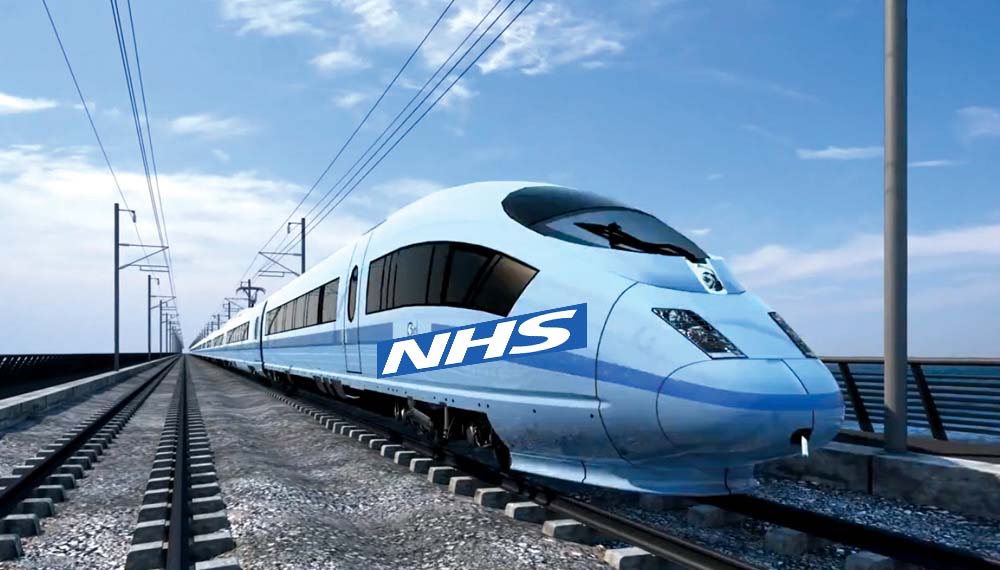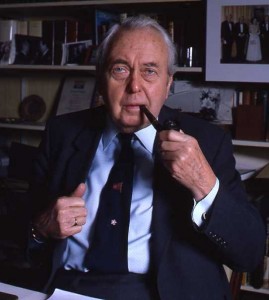Whilst many of us find the concept of the NHS being outsourced and privatised to the highest bidder quite revolting, there is also a vocal minority, with cumulatively sufficient numbers of them to hold office if not power, who believe that the Health and Social Care Act (2012) and concomitant “top down reorganisation” bring innovative, free market forces to make the NHS a “global brand leader” in the competitive world of healthcare. They believe it’s simply about making the new NHS, ‘NHS2′, “fit for purpose”, and it was only a matter of time under the two main parties (Labour and Conservative) that yet a further reorganisation of the NHS would become necessary. Arguably, the public would learn to love its benefits. Similarly, the public would learn to love HS2, “high speed 2″. Problematically, despite supportive noises from Osborne and Hammond about HS2, HS2 could still become derailed.
As the UK Labour Party hit their latest debacle of a Philip Morris stand at conference, having wished to make a stance on standard packaging of cigarettes, the tensions between populist stances maximising Labour’s electoral chances on May 7th 2015 and highly principled strategic stances based on policy have arguably never been stronger. If you’re not in Brighton for the Labour Party Conference, you might have caught sight of the “#stopHS2″ campaign in the social media. Also, if you have been spending time looking at tweets about Labour’s health and social care policy, you can see the criticism of Labour over the accelerated privatisation of the NHS is not without its critics. Even intelligent well-meaning Labour supporters have been collecting electronic clippings of the continued interest in the private finance initiative (and the involvement of Coopers and Lybrand in the Major and Blair governments) and the independent sector treatment centres of the Blair government. At a time when Labour is seeking to restore faith in the political process under Lord Ray Collins of Highbury, the question that Labour is so strapped of cash that it needs Philip Morris support remains an irritating one? The notion of the ‘democratic deficit’ is seen in both HS2, as such a policy issue not even mooted in the 2010 general election which seems to have gathered cross-party support (a bit like ‘personal health budgets), and in ‘NHS2′, the top-down NHS reorganisation implemented by the Conservatives with the Liberal Democrats aiding and abetting. So if nobody voted for either policy, where did the policies from? It might not be quite the “smoke-filled rooms of beer and sandwiches”, but powerful lobbying of private commercial interests are likely to have been proven influential in the past.
Whatever the official party positions on HS2 (and this has been subject to flux in recent months), both HS2 and NHS2 have formidable national grassroot campaigns in places. Stop HS2 is the national grassroots campaign against HS2, the proposed new High Speed Two railway. Theri mission is To Stop High Speed Two by persuading the Government to scrap the HS2 proposal and to facilitiate local and national campaiging against High Speed Two.Their supporters come from a wide range of backgrounds and from across the political spectrum. The “Stop Section 75 campaign” from 38 degrees aimed at thwarting the major competitive tendering construct of the Health and Social Care Act (2012), but it was ultimately unsuccessful. 38 Degrees is the one of the UK’s biggest campaigning communities, with over 1 million members. They share a desire for a “more progressive, fairer, better society”. They tried to argue earlier this year to all MPs and members of the House of Lords that our NHS is precious – and the public overall don’t want it privatised. Privatisation for both HS2 and NHS2, here, essentially means diverting of state resources into private sector hands.
Both HS2 and NHS2 are staggeringly expensive projects in this day when we keep on having austerity rammed down our throats, but admittedly the scale of spending of each project is different. Nonetheless by anyone’s standards, £32 billion as an estimate for #HS2 is an eye-watering amount of cash. It works out at well over £1,000 for every single family up and down the United Kingdom, and large numbers of us remain unconvinced that this will be money well spent. The exact cost of the NHS2 top down reorganisation is in its own different way unclear. Following on from Labour’s claims of ‘hidden costs’ last November, Shadow Health Secretary Andy Burnham claimed that the reorganisation planned in the Government’s Health and Social Care Bill (as it was then) amounted to costs of £3.5 billion, far more than the £1.2 – £1.3 billion claimed by the Government. Minister of State for Health Simon Burns branded this figure a ‘mistake’, reasserting the Government’s own figures as the correct estimate.
Also, both policies HS2 and NHS2 are “unpopular” with the general public. This is reflected by the fact they have never been openly discussed with the public before implementation. The public remain unconvinced about the actual rationale for HS2 to bring greater equity between London and regions of England (critics argue that the plan would benefit London more than the regions). Likewise, at a time when the ‘cost of living’ has been thrust into pole position by Ed Miliband, the cost of non-NHS providers providing NHS products and services for a cost which enhances shareholder dividend, the case for pimping out the NHS to the private sector has never been more badly timed. A YouGov poll into spending cuts commissioned by the TaxPayers’ Alliance last summer found that 48 per cent of people supported cancelling plans for HS2, with barely a third wanting to press ahead with the scheme. And it’s hardly surprising that the public remains so reluctant to support it. Andrew Lansley’s NHS reorganisation is unpopular both with the public and health service staff. Such a large scale reorganisation (likened to “throwing a grenade into the NHS”, by Conservative MP Dr Sarah Wollaston) would be difficult even in the Blair years of increased funding.
Research published by the TaxPayers’ Alliance last year into the hidden costs of HS2 further set alarm bells ringing, highlighting, for example, the billions of additional funding that would be necessary to mitigate the environmental effects of the line by running more of it underground or through tunnels. Andy Burnham, Shadow Health Secretary, spoke of a “bruised and battered” NHS that was in a “fragile” state. Burnham believes there is now a choice to be made about whether we want to allow the inexorable advance of competition in the market, or whether we want to hold on to a planned national system that many successive generations in England have benefited from.
Both HS2 and NHS2 pose fundamental problems for the Labour policy review, still currently underway. They poses problems for the UK economy – how much benefit are we actually going to get from this surge of spending to implement them? They also pose problems for the public’s institutions. Both the railway network and the NHS are cherished by the public but in different ways. Many citizens, whether they are Labour voters, think that the privatised railway industry has become costly, fragmented and essentially a shambles following Tory privatisation, and some would fundamentally like it in state ownership. While Burnham has consistently said the dichotomy between public and private is a false dichotomy, he has also reiterated his affirmation for the ‘NHS preferred provider’ policy which is a small attempt to mitigate against the loss of a state-run comprehensive universal National Health Service.
Both HS2 and NHS2 are ‘elephants in the room’, and it is merely a question of time for how long they may remain hidden.



